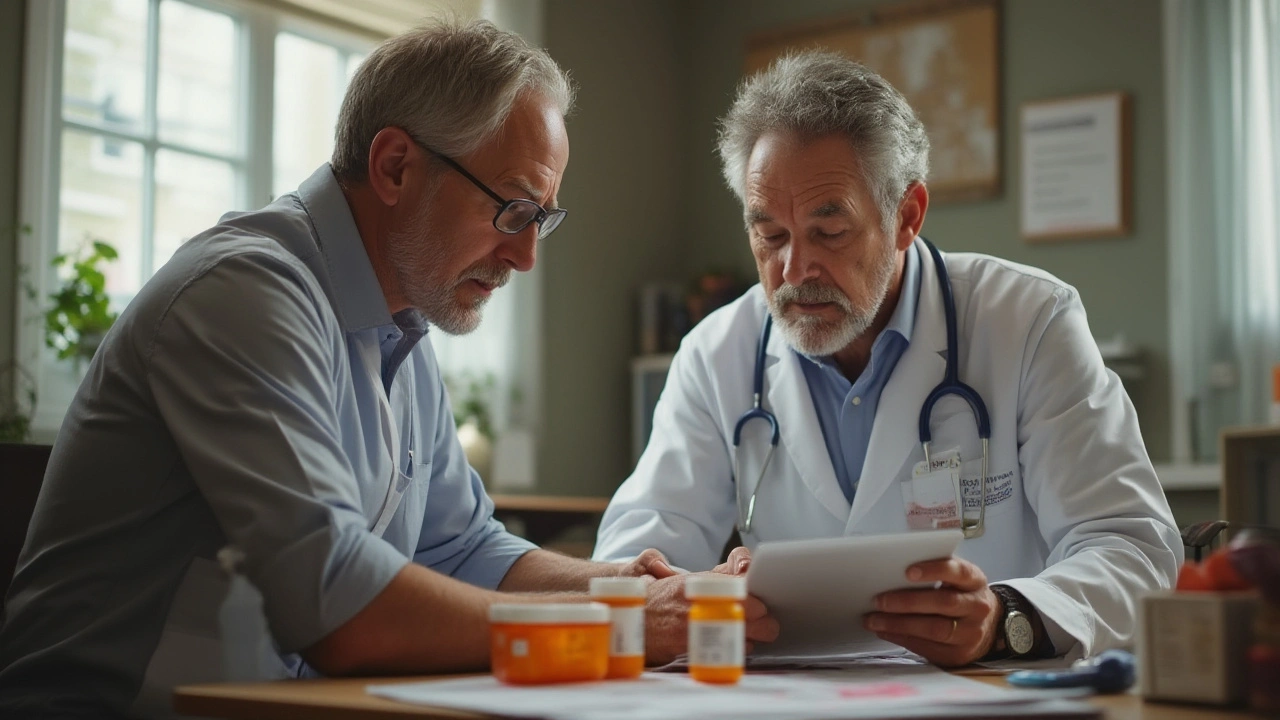If you’re living with diabetes and your doctor mentions famciclovir for an infection, you’re probably swamped with questions. Why this drug? Is it safe for your blood sugar? Could it mess with your other meds or make you feel worse? These are way more than academic worries. When you add up how common viral infections are with how many folks manage diabetes day-to-day, it’s easy to see why.
Here’s something most people don’t realize: diabetes doesn’t just tangle with blood sugar—it also changes how your kidneys and immune system work. Throw an antiviral like famciclovir into the mix and you have a recipe for potential surprises. Just a decade ago, researchers noticed that even common meds could act differently when paired with diabetes. And if there’s one place you don’t want surprises, it’s in your medicine cabinet.
Famciclovir Basics: What You Need to Know
Famciclovir is no household name, but it quietly does battle against some pretty nasty viruses—especially herpes zoster (shingles), genital herpes, and cold sores. It’s part of the same family as acyclovir, turning into its active form in your body and latching onto viral DNA to stop those bugs from multiplying any further. If you catch a shingles outbreak early, popping famciclovir can cut the pain and help you heal faster. That part’s simple. The tricky side is what happens when diabetes walks into the room.
For anybody with diabetes, your immune system can react differently to infections. Not weaker, necessarily, but sometimes slower, sometimes more aggressive in the wrong ways. Scientific studies from the early 2020s confirmed that people with any type of diabetes—Type 1 or Type 2—face a higher risk of severe infections and longer recovery times. The chance of nerve pain (post-herpetic neuralgia) after shingles rises sharply if you have diabetes, which is one reason doctors reach for antivirals quickly.
The problem? Famciclovir is mostly cleared out by your kidneys. Even mild diabetic changes in kidney function can slow this process, letting the drug stick around in your system longer than expected. One major pharmacology study found the half-life of famciclovir is about 2 hours in healthy people, but that doubles or even triples in diabetics with kidney issues. This could mean stronger side effects at normal doses. Some people might get headaches, dizziness, or feel unusually tired. Rarely, there’s confusion, hallucinations, or stomach trouble.
And there’s one more twist: viral infections themselves (especially the pain and inflammation) can spike your blood sugar. So some side effects you blame on a new medicine could just be your glucose swinging up or down in response to illness. The only way to know is by actually tracking.
| Aspect | Normal Individuals | Diabetics (with kidney changes) |
|---|---|---|
| Famciclovir Half-life | 2.0 hours | 4.0-6.0 hours |
| Side Effect Risk | Low-moderate | Moderate-high |
| Viral Infection Severity | Lower | Higher |
So, what’s the takeaway? Always share your full medical history with your doctor—not just "I have diabetes," but also how your sugar runs, any kidney numbers if you know them, and what other prescriptions you take. It’ll help them pick the lowest effective dose or even switch to another antiviral if risk outweighs reward.

How Famciclovir Interacts With Diabetes Medications
Pills, needles, metformin, insulin pumps—the list of diabetes tools grows each year. When you add famciclovir to your regimen, the first concern isn’t always direct drug-on-drug combat, but how each part shifts your glucose or metabolism.
Famciclovir itself doesn’t traditionally alter blood sugar. No classic research points to it spiking or dropping your glucose. But that’s not the whole story. Viral infections, especially herpes outbreaks, crank up physical and mental stress. You might struggle with eating, hydration, or regular movement, leading to blood sugar chaos. In Type 2 diabetes, stress hormones elevate insulin resistance. Folks on insulin or sulfonylureas are prone to lows if their appetite tanks but they still take the full dose.
- If you use famciclovir during an infection, check your blood sugar at least every 4-6 hours, even overnight if you feel different.
- Hydrate aggressively (think water, not juices).
- If your kidney numbers are changing, let your provider know before you start famciclovir. Dose adjustments are common in diabetics with kidney impairment.
One sneaky problem that trips up both patients and providers is how kidney function influences the levels of many drugs, not just famciclovir. Metformin, for example, also needs to be filtered out by your kidneys. If both medications stack up, your risk for something called lactic acidosis—a rare but very real emergency—increases. SGLT2 inhibitors like Jardiance or Farxiga also play by kidney rules, so any sudden change in urination, swelling, or unusual weakness should ring alarm bells.
The silver lining? No major studies have shown that famciclovir knocks out the action of insulin, DPP-4 inhibitors, or newer drugs like GLP-1 agonists (think Ozempic or Trulicity). But always ask your pharmacist about risks specific to your combination.
There’s a quirky detail here: even though drug companies usually test interactions, most research participants are healthy. Diabetics, especially those with complications, are underrepresented in clinical trials. So, what passes for "safe" in the leaflet or website might not ring true for you if you have erratic glucose, heart disease, or chronic kidney problems. Follow your body, not the marketing material.
If you end up needing steroids (sometimes used in severe shingles or viral eye infections), be extra cautious—those are the biggest culprits behind skyrocketing sugars. Add famciclovir to the mix, and you need even more regular glucose checks and possibly quick insulin dose tweaks. Having a log or smartphone app for notes can save you—and your care team—a ton of stress if things go sideways.

Real-World Tips for Using Famciclovir When You Have Diabetes
Not every doctor or pharmacist will spell out exactly what to watch for, so let’s get straight to the gritty details. If you’re prescribed famciclovir, plan for a few days of more frequent blood sugar checks. Don’t tough it out through headaches, nausea, or visual changes—those ugly symptoms can be red flags either from the infection, your blood sugar, or a medicine effect.
Stick to familiar foods while your body is fighting a bug. This isn’t the weekend to try new carb-heavy recipes or skip meals. Viral infections tank your appetite but failing to eat with usual meds risks hypoglycemia. Keep emergency glucose gels, juice boxes, or even hard candy handy if you’re on insulin or medications that can lower your blood sugar.
If you already use a glucose monitor or continuous glucose monitoring (CGM) system, use those trend data dashboards. Funny trend? Feeling off but your number looks normal? Trust your body over the screen. Sometimes it’s dehydration or a fever playing tricks and you’ll catch real changes by finger-stick tests. People with diabetes who track trends—especially during illness—catch problems early and recover faster. One 2023 patient-focused trial found that adults monitoring sugar closely during viral sickness were 40% less likely to end up in the ER compared to those who only checked "once or twice a day."
One practical tip: keep a notebook or phone note about your current prescriptions, doses, and allergies. If you get hospitalized, or even show up at urgent care foggy from high or low sugar, that paper can save time and confusion. Snap a quick photo of your pill bottles if you’re prone to forgetfulness when sick.
If nausea or vomiting last beyond 24 hours after taking famciclovir, call your doctor. Yes, viral infections can make you feel ghastly, but persistent vomiting might mean a reaction or toxic buildup (especially with kidney issues). On the flip side, if you notice a rash, sudden weakness in your limbs, or severe confusion, those are not normal and need urgent help.
- Schedule your famciclovir at the same time daily, with or without food, but don’t double up if you miss a dose.
- Most courses only last 7-10 days, but don’t quit early even if you feel okay. Stopping too soon lets the virus bounce back harder—especially risky with diabetes-lowered immunity.
- If your glucose sticks above 250 mg/dL or you have ketones in your urine during treatment, reach out to your doctor. High sugars plus infection can spiral into diabetic ketoacidosis (DKA), a medical emergency.
- Stay in touch with your care team—don’t assume you’re being a bother with questions. They’d rather get a quick update than triage an emergency.
For folks with both diabetes and past kidney problems, ask about checking kidney numbers before you start any new medicine, not just famciclovir. Creatinine and estimated GFR (the two numbers providers love) can make a huge difference in how strong your prescription should be. A quick blood test sets your mind at ease or flags a need for dose changes upfront.
And here’s something way too many people overlook: hydration isn’t optional. Antivirals and most diabetes meds work best when your body is properly hydrated. Drink plain water, skip sugary drinks, and avoid alcohol while sick. Even mild dehydration makes both viruses and medicine side effects harder to handle. Aim for clear or pale-yellow urine as a quick self-check.
If you work, have kids, or care for others, set an alarm or reminder for your next dose. Battling an infection on top of monitoring diabetes is exhausting—it’s easy to lose track and skip pills or meals. A little planning ahead really lightens the load when your body is in recovery mode.
Lastly, give yourself a break. Illness in diabetes is never easy, but knowing the risks and having a real strategy goes a long way. Famciclovir helps fight fierce viral infections, but keeping your blood sugar and kidney health in check is just as important. You don’t want medicine piling on to the virus’s mess. Be your own advocate—keep track, stay hydrated, and call for help if something feels off. Trust your instincts; nobody knows your body better than you do.


Comments (10)
mathokozo mbuzi July 10 2025
Famciclovir and diabetes intersect in ways that many patients overlook, so it's crucial to understand the risks properly. Famciclovir is an antiviral commonly used for herpes virus infections, but when it comes to diabetics, the concern mainly revolves around kidney function. Diabetes can impair renal health, and since famciclovir is expelled via the kidneys, dosage adjustments are often necessary.
Doctors typically check kidney function before prescribing and may reduce the dose to avoid accumulation, which could lead to toxicity. Another aspect is monitoring blood glucose levels because any infection or drug regimen could indirectly affect glucose control. However, famciclovir itself doesn't have a direct impact on blood sugar.
In terms of interactions, it usually doesn’t interfere with diabetes medications like metformin or insulin significantly. But caution is always warranted, especially in elderly patients or those with multiple comorbidities. Proper hydration is also emphasized to help excretion.
Overall, the management involves close medical supervision, personalized dosing, and patient education about warning signs. Has anyone here had personal experience or seen cases where adjustments made a real difference?
Amy Aims July 12 2025
Thanks for the detailed overview! 😊 I think it's really important to highlight that patients should never self-adjust their medication without consulting a healthcare provider. I’ve seen too many people get worried about their meds and just stop or change doses themselves, which can be super dangerous.
Also, a friendly reminder: if someone with diabetes starts famciclovir, they should keep an eye on hydration and kidney health like you mentioned. Simple things like drinking enough water can make a huge difference.👍
Do you think famciclovir could influence the risk of diabetic ulcers or skin infections since it's often used for herpes outbreaks?
Ari Kusumo Wibowo July 21 2025
Hey both, great points! I want to add something from the side of real-world patient experience.
I had a diabetic friend on famciclovir for shingles, and at first, he was super confused about whether he needed to change his insulin doses. His doctor assured him that famciclovir itself doesn’t spike blood sugar but emphasized monitoring it closely just because many factors, like stress from infection, can.
So yeah, the drug may not directly affect glucose, but diabetes management is dynamic, so infection control and meds play an indirect but big role.
One thing I noticed is that famciclovir is generally well tolerated, but if the kidneys aren’t checked regularly, that’s when problems start. No joke, guys – don’t skip those labs!
Olivia Crowe July 24 2025
Absolutely love the practical insights here! It really boils down to collaboration between doctors and patients, doesn’t it? When managing overlapping conditions like diabetes and viral infections, trust and communication are everything.
It’s also empowering for patients to know they’re not alone navigating this, and that monitoring isn’t just about numbers—it’s about keeping them safe and feeling their best.
Plus, emotional support during these times is key because the stress can really mess with blood sugar regulation.
Could a healthcare provider also recommend lifestyle tweaks alongside famciclovir treatment to ease the burden?
Dilip Parmanand July 28 2025
All good points, friends! Wanted to jump in and stress how often people neglect the interaction between infections and diabetic control.
Familciclovir treats viral infections that could otherwise prolong recovery, adding chronic inflammation and thereby indirectly worsening glycemic control. It’s a chain reaction. So treating the virus effectively speeds healing and helps keep diabetes stable.
Doctors must balance antivirals’ effects with diabetic meds very carefully. Given that renal dosing adjustments are key, labs before and during treatment are non-negotiable.
Shaik Basha August 1 2025
Yo, there's something else y'all gotta realize about famciclovir that ain't often discussed. The side effects, man! Like, when you're diabetic, you gotta watch out for the usual suspects: dizziness, headache, nausea.
These might not seem that hardcore, but if you already deal with blood sugar swings, these side effects can throw you off even more. Imagine feeling dizzy and light-headed while your glucose is also doing some wild stuff.
Tbh, I recommend anyone on this to check with their doc about symptom tracking. If things get bad, you might need a switch or dose tweak ASAP.
Also, does anyone know if famciclovir interacts with newer diabetes drugs like SGLT2 inhibitors? That combo might be tricky.
Sen Đá August 5 2025
It is imperative to underscore the necessity for rigorous pharmacological oversight when administering famciclovir to diabetic patients. The potential nephrotoxic effects demand comprehensive renal function monitoring prior to and throughout the treatment course.
Moreover, while famciclovir's direct impact on glycemic indices is negligible, the pathophysiological stress imposed by concurrent viral infections may exacerbate diabetic dysregulation significantly.
In clinical praxis, tailored dosage adjustments complemented by vigilant metabolic and renal assessments constitute the cornerstone of safe treatment paradigms.
Would the community concur that integrated care models are optimal in mitigating risks here?
LEE DM August 6 2025
Loved reading this thread — so many great points! One thing I’d add is the importance of patient education in diverse communities. Diabetes prevalence and healthcare access vary, and sometimes patients might get famciclovir without fully understanding the risk factors.
Healthcare providers must ensure instructions on hydration, medication adherence, and signs of renal issues are communicated clearly and culturally appropriately.
Any thoughts on how telemedicine might help bridge these gaps, especially for rural diabetic patients needing antiviral care?
Penny X August 6 2025
This discussion is fine, but let’s not sugarcoat the risks too much. Diabetic patients are already vulnerable, and throwing any antiviral in there without strict controls could lead to disaster.
Everyone needs to understand the gravity — ignoring kidney function, drug interactions, or side effects on glucose levels can cause serious harm. These are people's lives, after all.
Doctors who don’t take these issues seriously deserve criticism because it’s a matter of standard professional care.
Has anyone read recent papers exposing reckless famciclovir prescribing in diabetic populations?
Michael Ieradi August 8 2025
Some great discourse here! Just to chime in, from a punctuation standpoint (haha), it’s essential to communicate these medical facts with clarity to avoid confusion.
For example, when discussing famciclovir's effects, commas help clarify complex lists: the risk factors, the interactions, the management steps.
For non-specialists reading this, well-structured sentences ensure the message is digestible and impactful, preventing misinterpretation that could affect patient behavior.
What do you all think about the role of plain language summaries in medical discussions online?